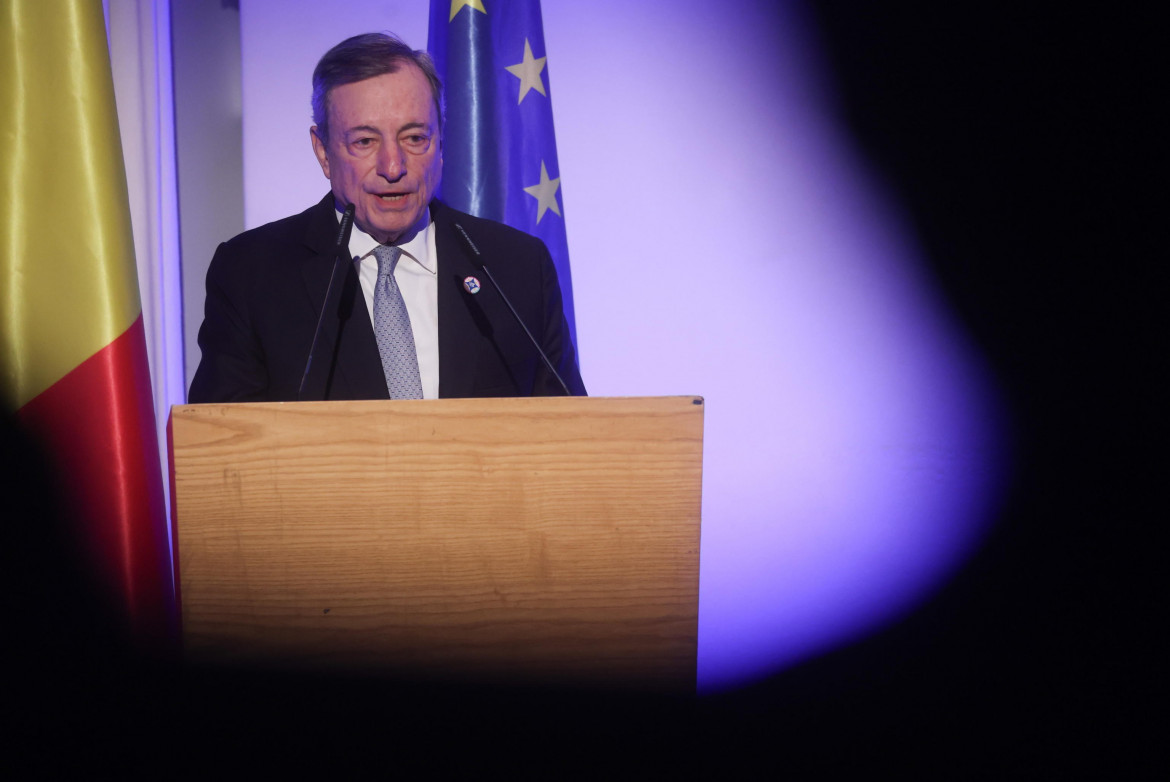Analysis
Mario Draghi: The EU must transform its entire economy to compete with China and the US
It's not about ideals, or at least not only. At issue is the possibility of competing with China and the U.S.: thus, of economic survival, but consequently also of political survival.

The European Union must be changed from top to bottom, argued Mario Draghi on Tuesday in his speech at the European Conference on Social Rights organized by the Belgian rotating EU presidency in La Hulpe, near Brussels.
This requires “radical change” and a “transformation across the European economy.” In short, it requires a re-founding “no less ambitious than what the Founding Fathers did 70 years ago with the creation of the European Coal and Steel Community.”
But this is not the only challenge: we must also get it done at breakneck speed, because “we do not have the luxury of delaying the answers” to these questions, and if there are those who resist, “we should be ready to consider going forward with a subset of Member States.”
With these words, Draghi offered a preview of the report on the EU’s competitiveness that he is preparing at the request of President von der Leyen. He will present the full version on June 27, but this is already the third occasion on which he has spoken out about what it will contain and what its thrust will be. He did so in front of the European Economic Ministers and then in front of representatives of parliamentary groups. Each time, he has raised the level of urgency and criticism a little more: a clear sign of how much he is keen to set up very high expectations around his report and the parallel one by Enrico Letta and former minister Giovannini on the European common market.
It’s not about ideals, or at least not only. At issue is the possibility of competing with China and the U.S.: thus, of economic survival, but consequently also of political survival. With the Chinese and American giants on each side, Europe is likely to find itself between a rock and a hard place. Draghi pulls no punches in his assessments. China “is aiming to capture and internalize all parts of the supply chain in green and advanced technologies and is securing the access to the required resources.”
With Washington, it’s even worse, because the U.S. “is using large-scale industrial policy to attract high-value domestic manufacturing capacity within its borders – including that of European firms – while using protectionism to shut out competitors and deploying its geopolitical power to re-orient and secure supply chains.”
Europe, on the other hand, is trudging and floundering, slogging along, under the burden of a limitation that, if not overcome quickly, will spell its doom: division, the lack of integration on all fronts, from green energy development or integrated defense to joint procurement and investment in public goods. A simple problem, but one that is very difficult to solve: “Our rivals are stealing a march on us because they can act as one country with one strategy.” Instead, Europe is fragmented, as was clearly on display on Tuesday: the conference was supposed to end with a joint declaration, but this turned out to be impossible because of the thumbs-down by Sweden and Austria.
Such a speech as Tuesday’s – and the even more thunderous and detailed one that will come on June 27 – clashes with the image of the man who had retired to private life to “just be a grandfather,” as the former ECB president had said when he left the post of Italian Prime Minister.
If everything adds up – that is, if the Union proves responsive to the proposed directions and revolution, Draghi will inevitably be in the running for a direct role and a position among the European leadership: president of the Commission or, more likely, of the European Council. While words don’t necessarily mean much by themselves, the responses so far have been supportive towards the ambitious goal he is outlining.
Ursula von der Leyen put her weight behind Draghi and Letta’s work, saying that “it shows us the way for the future.” Not even Orbán had anything negative to say: “I like Draghi. I respect him and he’s a good man.” Italian Senate President La Russa, a senior leader of the only party that stood in opposition to Draghi’s government, was full of praise: “He has the qualifications to aim for any position.” Bonino, clearly his most ardent supporter, went straight to talking about the former premier’s run for president of the European Council.
However, the road ahead is by no means a smooth one. First of all because, public praises aside, few in Europe are willing to change things as drastically as Draghi’s project would require. Then, because national leaders have always favored having weak Commission and Council presidents; in any of those roles, Draghi would be quite the opposite.
Originally published at https://ilmanifesto.it/la-scossa-di-draghi-alla-ue-cambiare-tutto on 2024-04-17
